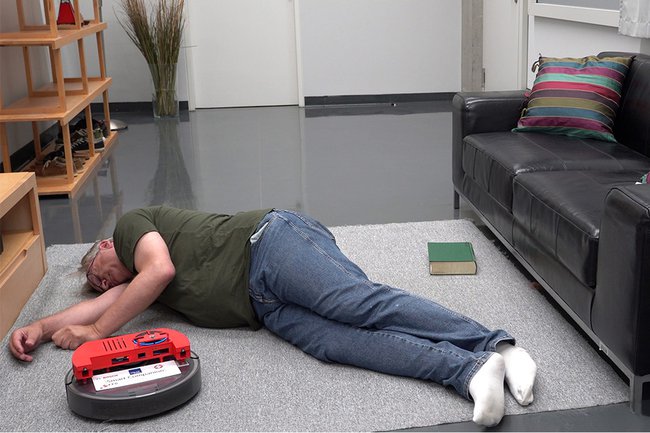Robot Vacuum Cleaner as First Aiders
Smart Everyday Device Becomes Assistance System in Emergeny Situations

Statistics demonstrate that a third of people aged over 65 fall at least once a year. The older people get, the higher their falling risk. In particular, older people can suffer from injuries as a result. At the same time, we all want to live in a self-determined way up until old age. Researchers of the Institute for Creative\Media/Technologies made a commercially available cleaning robot more intelligent to help older people in their everyday lives and in emergency situations. The so-called “smart companion” is able to detect falls and call an ambulance in an emergency situation.
“We do not want to have people living on their own to be helplessly lying on the floor for hours. This is why we have researched the development of an everyday device to help within a reasonable timeframe”, highlights project lead Andreas Jakl of the St. Pölten UAS’ Department of Media and Digital Technologies.
Developed and Tested Prototype
The project team built a ready-to-use prototype. Vacuum cleaner robots, which are by now widely used and equipped with many sensors, detect persons who fell. The person who fell can communicate through a speech assistant such as Alexa to call for help. Both applications are deemed accepted in the wider public. The smart vacuum cleaner robots were moving automatically through the apartments of senior citizens living in supported apartments by Samariterbund Linz.
“The system has been tested and proven in everyday life. The vacuum cleaning robots kept the apartments clean – which helped boost their acceptance – and people like them because they can also assist in emergency situations. Data protection and privacy was particularly important to us. The system was approved by an independent ethics committee”, says Jakl.
Strong Partners
Robert Bosch AG has played an important part in the development of the AI. As a European manufacturer of household devices and smart home systems, they are a key partner for ensuring practical feasibility. The group Linz of the Austrian non-profit foundation Arbeiter Samariter Bund (ASB) operates an in-home medical alert system with tested and proven bracelets. The ASB is very keen to learn more on innovations that can further increase their acceptance among users. The Academy for Ageing Research at Haus der Barmherzigkeit has vast knowledge on support and care for old people and ethical implications in this respect.
About Smart Companion
The research project Smart Companion was implemented by the St. Pölten UAS in partnership with Robert Bosch AG, group Linz of Arbeiter Samariter Bund (ASB), and the Academy for Ageing Research at Haus der Barmherzigkeit Gruppe Linz.
Smart Companion was funded within the framework of the programme “ICT of the Future” by the Austrian Federal Ministry for Climate Action, Environment, Energy, Mobility, Innovation and Technology (BMK).
For further information go to the research website.
